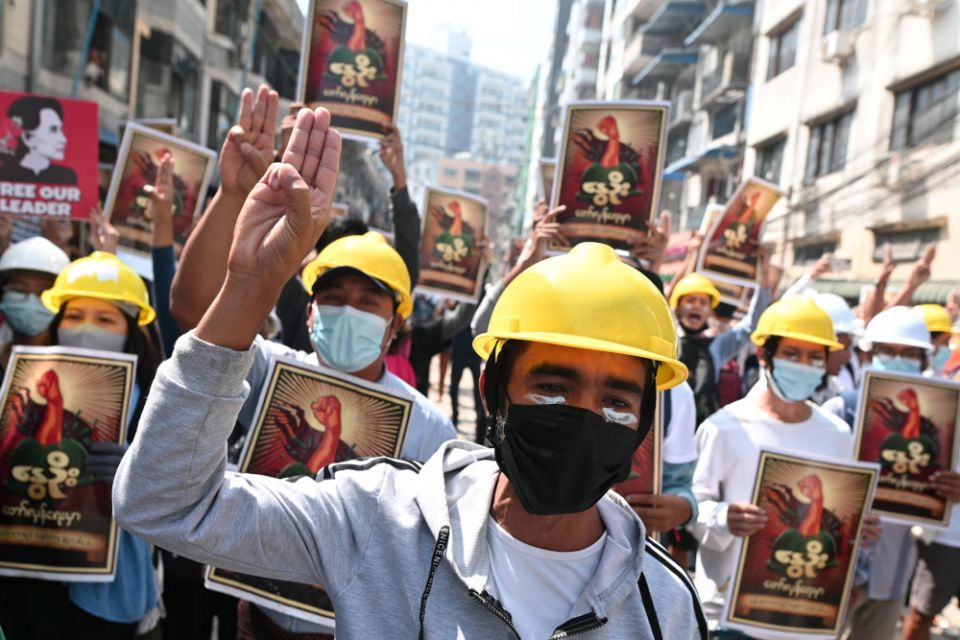We interviewed Thinzar Shunlei Yi, a Burmese grassroots activist who told us about the situation in her country today, eight months after the bloody military coup. Myanmar is a former British colony with decades of political instability. It is of strategic importance for China due to its natural resources and its access to the Indian Ocean, which would provide a major economic boost to southern China. The United States, in the Biden era, cynically postures about”democracy” with the aim of restoring the legitimacy of international institutions. These actions are part of the United States’ effort to reassert itself in its competition with China, its strategic competitor.
Aung San Suu Kyi’s National League for Democracy won the November 2020 elections, and was deposed by the coup. She had previously co-governed the country with the army and was silent in the face of the crimes it committed against ethnic minorities. Now she is part of the leadership of the exiled opposition front to the military junta, the “National Unity Government” (NUG). The NUG issupported in this dispute by several major powers including the United States, France, and United Kingdom. The real opposition to the coup d’état arose in the factories and the textile workshops, with workers and youth carrying out strikes and fighting in the streets against the military tanks.
Can you tell us about the current situation in Myanmar?
The junta has so far arrested more than 8,000 civilians across the whole nation and they have killed 1,100 civilians in the streets. After the defensive war, we are seeing more soldiers and police defecting from their outposts and joining the movement. The junta has increased its attacks on civilians, especially in central Myanmar and in ethnic areas. They used airstrikes and raided different villages, they burnt down houses and killed everyone. These are crimes against humanity, war crimes.
The defensive warfare is based on guerrillas made up of different ethnic groups, is that correct?
We have more than 100 ethnic groups inside the country and more than 30 of the biggest armies in different areas of the country, which have their own territory. So when the NUG builds their “people’s defense force,” they are basically building their own army, not joining the the ethnic armies. The ethnic groups have their own armies, they don’t want to intrude or take over other different lands, they are just defending their own lands since they’re independent. What we’re seeing is the NUG working with different ethnic armies because the administration army is now protecting them from the junta, but that does not mean that they are a part of the NUG.
What is the situation for the working class?
After 2010, the first ever election in Myanmar, we had limited freedom where we could organize unions. It was the labor unions who launched a big strike in Yangon, the biggest city. Thousands of workers, mostly women, launched big strikes, which inspired many mass strikes afterwards. They are the backbone and the ones who stood up to the junta. They showed us the way and joined in the civil disobedience movement.
The point is the people of Myanmar — even though the majority of us are working class — are not in the mainstream media and lack recognition. That’s what worker groups are demanding — to have more visibility in the struggle — because they suffer the most under the junta.
What can you tell us about the situation for women?
The image you see on my background is a woman lifting up the longyi [a long cloth garment worn around the waist], that’s what we call it, to cover up our legs. Now we are raising it as a flag, and that’s a groundbreaking movement because in Myanmar there’s a big taboo around women’s products and clothes, which are considered dirty. The movement gave a lot of encouragement to the more than 50 percent of the population in the country who are women. Now women are leading different strikes almost every day on the ground.
What is the situation for the Rohingya people?
Even after four years of their struggle, after the genocide against them, none of the perpetrators are being held accountable. What happened after four years is nothing, the Rohingya still remain stateless, they still remain in the refugee camps, and their suffering continues. The international accountability and justice system is failing the Rohingya population.
Now the military is committing the same crimes against the whole population. Of course the Rohingya suffer ten times worse than what they are doing right now in the big city, but still they are killing using snipers, airstrikes, and other weapons to oppress the masses and civilians. None of the international actors could stop the military from using violence. They just make demands and release statements and talk and talk back, but what has happened? The people are still getting killed and arrested. I’m losing friends and family, my country is basically a cemetery.
The minorities, they have been fighting against the same institutions for the past seven decades. Now they are joined by many young people and the majority of Burmese people, now we are trying to take down the military. The NUG it’s a part of this process, but they are not the main one because the farmers, workers, and students are the movement leaders, they are the main backbone. If NUG is not doing a good job then they could be taken down.
Do you consider that the military junta, through the coup, has settled into power?
What we are seeing is that the coup attempt is not yet successful because we don’t submit to them and the resistance is still really strong. Basically they can’t build their own administration, they can’t give orders to the communities, the villages, and the township because the people are resisting and revolting against them.
Who controls the country’s main economic levers?
The military. The pillars that support them to fuel their actions include the financial institutions and international investment. Indirectly or directly they are benefiting from the crimes inside the country. We are trying to push the international community to impose targeted sanctions on those businesses, the military-affiliated businesses. We are asking them to stop working with these institutions so that they stop functioning.
The economy is collapsing, our currency has dropped like never before in history. The junta is still announcing that they are ruling the country and they will make sure they continue to be able to do so. That’s what the resistance forces are trying to make sure they fail at. The labor unions are calling for comprehensive sanctions that will impact them a lot — they will lose their jobs and so on, but the labor unions say they don’t care. That’s how the economy is collapsing: it is intentional, because the resistance forces and the people are trying to prove that the junta is not capable of ruling the country.
The junta is basically being supported by Russia and China. There are other countries who are selling weapons to them, and we are trying to stop them.
What do you think of the United Nations?
In Myanmar the general public say the UN is “united nothing.” We feel the UN is failing us — they don’t even get out to explain what is going on or respond to the general audience begging them to do something, they don’t even care.
We are so worried that this institution might work with the junta, under the name of humanitarian help, a relief program, and so on. That they would just sign the contract with the junta as a way of giving legitimacy to the junta as a government body. We are very worried and see that they can do it — that’s why we denounce them. They do not help at all.
People have lost faith in the UN and whatever other international mechanisms. The international community has failed the people of Myanmar.
Thank you very much for giving us this interview. Would you like to add anything else?
We are in solidarity with the peoples around the world who are oppressed, who are being marginalized, who are vulnerable in different communities, like in Afghanistan or in Argentina. We are wary of governments, but the people, we always stand in solidarity and share their struggle.
Originally published on October 3 in Spanish in La Izquierda Diario











